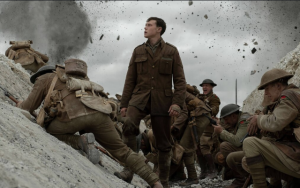1917: 4 STARS. “beautifully grim movie and window into the horror of war.”
 “1917” is a simple story of duty wrapped up in a high gloss technological package that delivers a vividly immersive look at life during wartime.
“1917” is a simple story of duty wrapped up in a high gloss technological package that delivers a vividly immersive look at life during wartime.
Designed to look like one continuous shot, the action in “1917” begins in the trenches of Northern France with two men, Lance Corporals Schofield (George MacKay) and Blake (Dean-Charles Chapman), assigned a dangerous mission. With telephone lines down, their general (Colin Firth) dispatches the pair travel through No Man’s Land on foot to the front lines. If they can make it past the barbed wire, booby traps and German snipers, they are to deliver the message that the Germans have set a trap, enticing the unwitting British to attack. “If you fail,” says the general, “it will be a massacre.” If Schofield and Blake are successful they could save 1600 lives, including Blake’s Lieutenant brother (Richard Madden). But first they must travel through eight miles of the most dangerous territory on earth.
It’s easy to feel that “1917” is a gimmick film. In the opening scenes I found the continuous, one shot nature of the filmmaking a distraction. I kept wondering, “How is Sam Mendes doing this?” or looking for clever, surreptitious edits. It took me out of the story but once accustomed to the gliding camerawork by the legendary Roger Deakins I began to focus on the story’s tale of bravery and resilience and less on the trickery that created it.
The horrors of war are duly represented—there’s barbed-wire, dead, rotting bodies litter the landscape and a bombed-out town is nothing more than the skeletons of buildings—but “1917” doesn’t focus on that. This is a contemplative story of a mission and the men who sacrifice their own safety for the greater good. It highlights the ever-present danger of attack but it’s the character’s emotional journey that makes for the compelling story. Blake wants to stop his brother from walking into a trap while Schofield is driven by a sense of duty. Both men are working for the collective, which in our era of the individual, is a potent reminder of the importance of cooperative effort.
“1917” is a beautifully grim movie. Death lurks around every corner and the success of Blake and Schofield’s mission is never assured. Hope is a remote, elusive concept in the theatre of war but Mendes weaves in enough humanity—the relationship between the soldiers, a scene with a French mother and her daughter—to give us a window into the horrors of war.
